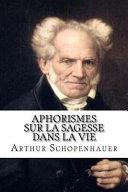“Dans toute controverse ou argumentation, il faut que l'on s'entende sur quelque chose, un principe à partir duquel on va juger du problème posé : on ne saurait discuter avec quelqu'un qui conteste les principes.”
Contra negantem principia non est disputandum.
La Dialectique éristique publiée en Français sous le titre L'Art d'avoir toujours raison, 1830

